 Who’s responsible for Blizzard Entertainment’s string of money-minting video games? Meet Paul Sams, the chief operating officer of Blizzard, now a division of Activision Blizzard, the gaming powerhouse created from the $18 billion merger in 2007 of Activision and Vivendi Games.
Who’s responsible for Blizzard Entertainment’s string of money-minting video games? Meet Paul Sams, the chief operating officer of Blizzard, now a division of Activision Blizzard, the gaming powerhouse created from the $18 billion merger in 2007 of Activision and Vivendi Games.
He’s one of the top executives responsible for making sure Blizzard keeps pumping out hits like World of Warcraft, which has 12-million-plus paying subscribers. This year, Blizzard celebrated its 20th anniversary (see the company’s own retrospective here), and 2010 was its biggest financial success in its history, thanks to the launches of World of Warcraft Cataclysm and StarCraft II. By far, World of Warcraft is the most successful game in Blizzard’s history; author Jane McGonigal says gamers have collectively played about 5.93 million years of WoW. WoW players put in about 30 million hours a day.
Blizzard continues to work on ground-breaking titles, including Diablo III, a new StarCraft expansion, and a secret massively multiplayer online game called Project Titan. But the competitive environment around it is changing. Lots of game companies are diving into free-to-play games, where users play for free and pay small amounts of real money for virtual goods. Companies such as Microsoft are diving into this business model for online games with titles such as Age of Empires Online. Electronic Arts will also challenge Blizzard with a Star Wars MMO this year and Trion Worlds has recently launched its fantasy MMO, Rift, in direct competition with WoW. There isn’t any real danger yet. But at some point, those games could conceivably threaten World of Warcraft’s base of paying subscribers.
Here’s our Q&A with Sams, and read here for our previous Q&A with Sams.
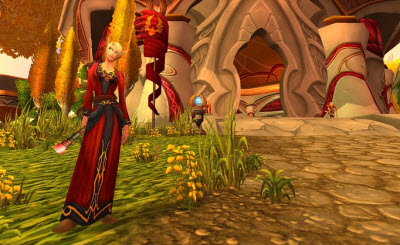 VB: So what are your observations about Blizzard’s 20th anniversary?
VB: So what are your observations about Blizzard’s 20th anniversary?
PS: Back in the early days, we didn’t think 20 years out into the future. We didn’t think it was possible to have the type of success we have been fortunate enough to have. But when I sit back and I reflect on these two decades, it’s been an incredible ride for us. We’ve maintained our core mission of making the most out of our games. We focus on making the most epic entertainment experiences ever, and I think we’ve really stuck with our values. It drives our decisions and has allowed us to provide a level of consistency in what we’ve been able to deliver. We have been able to make many of the top-selling PC games in the world for many years.
It’s tough to run a successful company for 20 years. We are very proud and humbled by it.
VB: How many people are working for you?
PS: We’ve got around 5,000 globally. We’ve got offices in Irvine, Calif., which is our global headquarters. Our U.S. call center is out in Austin. We’ve got about 800 people there. Then we’ve got our offices just outside of Paris and the European main call center is in Cork, Ireland. And then when you get over to Asia, we’ve got Shanghai, Taipei, Singapore and other places. A lot of good things have come from having a global presence.
One of our company values is to think globally, so we’ve really done that and I think we were truly the first company in the game space that did global launches. And when I say global launches, I don’t mean just U.S. and Europe. I mean Japan. I mean Asia. There is really no other company that’s really done that and there is no other company that has been able to reach top position regardless of company in each of those markets.
 VB: I would guess there are very few surviving game companies that were started about the same time yours was.
VB: I would guess there are very few surviving game companies that were started about the same time yours was.
PS: They’ve all either gone away or they’ve been acquired. Our average senior executive tenure is over 15 years. So we’ve got our same management and even if we’ve gone through a number of transitions with various parent companies or sister companies over the last couple of decades, we’ve been able to maintain our identity. We’ve been able to maintain control of our business and the decision-making over what products we make and when we release them and how big or small they are and what audiences we reach. So we’ve been very fortunate, and I think the reason we’ve been fortunate is because we’ve consistently been able to deliver the results.
VB: And nobody messes with the golden goose.
PS: I think that’s true when you are performing the way that we have, thankfully, been able to continue to perform. It doesn’t make a lot of sense to mess with that. We’ve been fortunate that, with each of the parties we’ve been involved with, we’ve been able to convince them through our actions and our results that they really should be focusing in other parts of the business and not on us because we are going to deliver what we promise.
VB: I remember when you folks talked at the Dice Summit about how many games Blizzard had developed by decided not to ship over the years. That said a lot about your stance on quality control.
PS: There is a huge number of those games.
VB: You are brutal on yourselves that way.
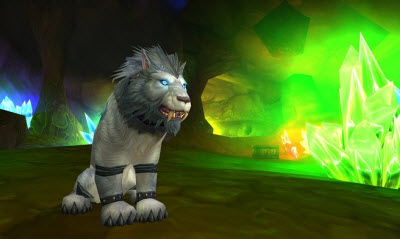 PS: I will tell you something. When you look at our brand, players support us and trust us. From our perspective, you get very few opportunities to build that trust, to keep that trust, and if you deliver a game that does not meet their expectations and it’s just okay, it’s acceptable, well then you breach that trust. We are very thankful to have the players that support us. They consistently vote with their pocket books that we are fulfilling their expectations and their wants and dreams as it relates to games. And we are very mindful about what those people feel about us, what they think about our games and whether or not we’ve addressed their wants and needs. We are very connected with them. We’ve got a few thousand customer service people. I think we have the largest service group of any video game company in the world.
PS: I will tell you something. When you look at our brand, players support us and trust us. From our perspective, you get very few opportunities to build that trust, to keep that trust, and if you deliver a game that does not meet their expectations and it’s just okay, it’s acceptable, well then you breach that trust. We are very thankful to have the players that support us. They consistently vote with their pocket books that we are fulfilling their expectations and their wants and dreams as it relates to games. And we are very mindful about what those people feel about us, what they think about our games and whether or not we’ve addressed their wants and needs. We are very connected with them. We’ve got a few thousand customer service people. I think we have the largest service group of any video game company in the world.
VB: How many developers do you have?
PS: It’s less than 1,000 of the 5,000 who are in development. The rest are service as well as headquarters and the other functions that you anticipate like in PR. So we have the largest number of community team members of any game company out there. We listen to our players intently, and we really try to be focused on delivering what they are asking for. We are on the forums, we read every post, we get tons of petitions and contacts. All of those pieces of information come in we break down to bite-sized actionable chunks. We deliver this intelligence to the applicable people so they can effectively address concerns and issues quickly. We do make mistakes, and we hope we learn from them faster.
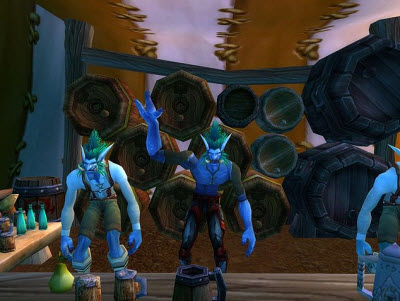 VB: So what do you think of the word “disruption” when it comes to the video game industry. Will subscription gaming be disrupted?
VB: So what do you think of the word “disruption” when it comes to the video game industry. Will subscription gaming be disrupted?
PS: It might and it might not. I will tell you that with very few exceptions, most games don’t have the life cycle to last as a subscription game. If you look at the historically most successful subscription games, World of Warcraft is at the top. We are continuing to grow that game in our seventh year. You look at games like Lineage in Asia, they continue to be chart toppers. Those are subscription-based games. If you look at some of the other more item-focused games, with the virtual goods models, they don’t last as long. Those are the games that tend to have four sequels because they’ve got to do something new to compel those players to keep playing.
As it relates to free to play, I do think that is an interesting business model. But it is not going to allow those companies to create the type of complexity and experience that a subscription-based title like World of Warcraft can have. The fact of the matter is, the companies that make high-quality games have to have monetary backing and they have to be able to generate revenue that covers the costs of initial and ongoing development.
We have these recurring revenue streams, which allows us to invest and to provide experiences and services to our players unlike any other company. The free-to-play games have to go about trying to find other revenue streams, and those revenue streams are inherently smaller. That means the game development budgets are inherently smaller. That is not to say you cannot have an awesome free-to-play game that costs less to make. There are lots of examples of those successful games. I do think that with the free-to-play games you may reach audiences that you don’t traditionally reach with the subscription games. That makes sense because you are not going to find a lot of casual first-time gamers signing up for a $15 a month subscription.
The free-to-play games serve an important role. Like the theme parks that compete with Disneyland. You can go see all of those experiences, and then you will come and do it all with us. We are going to create the most immersive experience and the most engaging, deep experiences. That is because we can put a big budget behind our efforts that the free-to-play games can’t match. I like these other games personally and I dig the fact that small development teams can work on games again. There was a period of time that was not possible because the budgets had gotten so big.
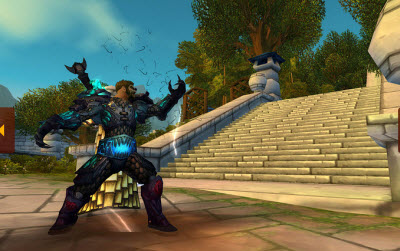 Now we can see small groups making mobile and iPad games. That is positive for us. That means a lot of developers can spread their wings and build new kinds of games. We want them to graduate to doing bigger games, and we hope to draw from them from a talent perspective.
Now we can see small groups making mobile and iPad games. That is positive for us. That means a lot of developers can spread their wings and build new kinds of games. We want them to graduate to doing bigger games, and we hope to draw from them from a talent perspective.
We are always looking for the best and brightest people to hire. There was a time when it was harder to find independent garage teams. We had to expand to other countries and recruit beyond areas we had gone to before just to tap the talent pool.
Now there are all these people who love games. Maybe they don’t have the experience and capability to come work for one of the big companies yet. They may also say, screw it, we’re are going to do this ourselves. And they do these smaller things, they see some success, they start getting the budgets to do more, and they produce cooler stuff. Then they do have experience that is applicable to our games.
VB: What is your thinking about when to do a new game instead of continuously refining your older game? When do you do the next MMO?
PS: We have another MMO that I don’t think we’ve been talking about.
VB: Project Titan, right? Based on the leaked schedule.
PS: We will just talk about “the project” [meaning he won’t acknowledge the leaked code name].
VB: Yeah, so how do you decide that?
PS: We intend to do more expansions too. There is no change in our thinking. We intend absolutely positively to continue to support the existing World of Warcraft product. There are over 12 million global paying subscribers that are active in our game. We are not going to turn our back on them and we intend to continue to support that franchise for many many years to come. As to our new unannounced game, we believe that it will be more complementary than competitive. And while people do have a limited amount of free time that they can devote to these types of games, we do think that people will want to check out the new and the old. We think the new one is very compelling and is going to capture a lot of hearts and minds and will be very successful for us. But we also believe that many people will continue playing World of Warcraft because they have such a huge collection of friends and community. We have taken some of our most experienced developers and put them on this project. We believe we have a dream team. These are the people who made WoW a success. We are going to blow people’s minds.
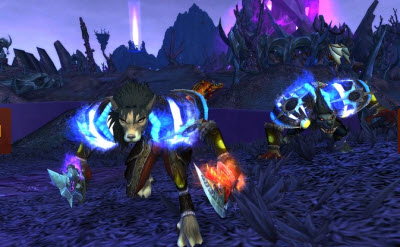 VB: That’s a tease. It sounds like you can take some lessons from seven years of WoW and apply them to a new game?
VB: That’s a tease. It sounds like you can take some lessons from seven years of WoW and apply them to a new game?
PS: Yeah (Blizzard CEO) Mike Morhaime talked about this. We really try to learn from what we’ve done in the past. When you architect the game, you architect it with the vision that exists at that time. We’ve got some vision for what is coming and how gaming has evolved. Some of the new things that maybe we would want to do, we can’t do as elegantly because of the way we’ve architected the old game. It’s easier if we are starting fresh. So that being said, we are doing that sort of thing and it’s also not the same game. It’s a different game, so we do feel it’s important to our developers as well as the players for us to deliver something else that can expand their gaming experiences.
VB: And what’s your observation about social games and mobile games and how fast they have come into the center of the discussion?
PS: They are obviously very hot, and I personally I am very geeked up about it. I have an iPhone. I’ve got an iPad. I am very engaged in playing those games. I dig them, I’ve got a lot of them. My kids are playing and they both have iPads. Both my sons and my daughter have an iPod Touch. So they all are playing games and they are sharing their gaming time between a PC and Xbox 360. Their tablets are handhelds. They play on the DS. The games are getting cooler and are so much more easily accessible because you can download from the App Store and they don’t have to get mom and dad to take them to a store. I am stoked about it because I rarely have long periods of time to play. I have a lot of 5 minute chunks here and there. Hey, I think if I’ve got five minutes and no kids are bugging me and no one is calling me to do something, I will often look at my emails. If I don’t want to do that, I might play a little Angry Birds. I mean it just happens.
VB: So you play when you are in the bathroom?
PS: Well, I can, I don’t know about you, but….
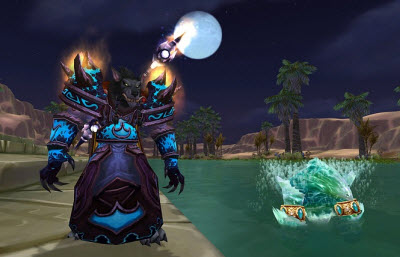 VB: Do you think that the back-end server infrastructure that Blizzard has built is now a competitive advantage?
VB: Do you think that the back-end server infrastructure that Blizzard has built is now a competitive advantage?
PS: I personally believe that our back-end infrastructure gives us a competitive advantage over other MMO companies. We have the biggest single audience of subscription gamers. It’s very complex and there are thousands of systems that support us.
If you talk to certain hardware manufacturers that we use, they will tell you that we push the hardest. We push more than any other company or any other industry when it comes to making our servers produce. We push for the technical advances for server and blade architectures. We have the numbers that justify pushing hard on the edge of technology.
When I see a new company, and they talk about a cool-looking game, I think about how they are going to operate it. People forget that with Battle.net, we developed the world’s largest free online gaming network starting in 1996 for StarCraft. We learned that you have to do the right thing for your customers when you make decisions about infrastructure.
There are no other companies that have had that experience. We have a lot of experience dealing with people around the world, millions of players simultaneously. It is non trivial. Some companies launch their games and often lose entire days of downtime because they don’t have the experience. We are able to launch on a worldwide basis when we have a new game. We do that fearlessly.
VentureBeat's mission is to be a digital town square for technical decision-makers to gain knowledge about transformative enterprise technology and transact. Learn More
